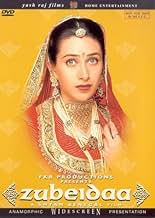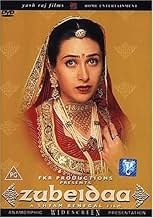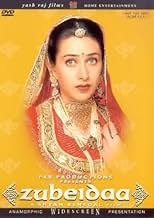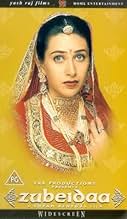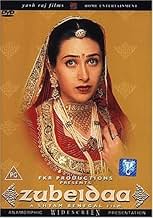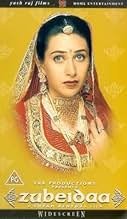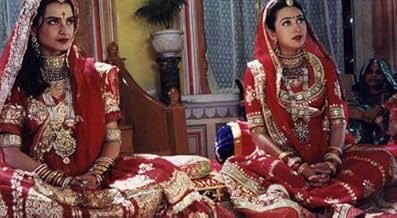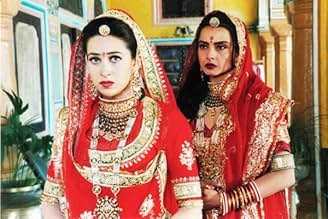NOTE IMDb
6,6/10
1,8 k
MA NOTE
Ajouter une intrigue dans votre langueZubeidaa, an aspiring Muslim actress, marries a Sikh prince to become his second wife. Her tumultuous relationship with her husband, and her inner demons lead her to a decision which has fat... Tout lireZubeidaa, an aspiring Muslim actress, marries a Sikh prince to become his second wife. Her tumultuous relationship with her husband, and her inner demons lead her to a decision which has fatal consequences for them all.Zubeidaa, an aspiring Muslim actress, marries a Sikh prince to become his second wife. Her tumultuous relationship with her husband, and her inner demons lead her to a decision which has fatal consequences for them all.
- Réalisation
- Scénario
- Casting principal
- Récompenses
- 3 victoires et 15 nominations au total
Manoj Bajpayee
- Raja Vijendra Singh
- (as Manoj Bajpai)
Rajit Kapoor
- Riyaz Masud
- (as Rajit Kapur)
Avis à la une
Shyam Benegal continues to carve out a niche as one of the leaders & promoters of indian parallel cinema. this film is based on a true story, set in last days of British rule in India. the acting is good all around, although no fireworks here. Karisma is as good here as she was in FIZA. it is a fairly straight forward biography, and although it was nicely done, i found it rather luke-warm as compared to Benegal's other films. in any case, it is a much needed break for viewers who are tired of watching typical Indian masala potboilers.
10suhailmu
This is by far one of the best Indian movies I have ever seen. One really gets a sense of the life in the early 1950's in India. The plot is very rich. Full of life. Full of characters, nuances. There are so many stories in the background: partition, status of Muslims in India, Indian cenima, fate of Indian principalties. The dialogue is just awesome. But, of course, the focus and center of the movie is the story of Zubedaa. Khaled Mohammed's script -- based on the life of is mother -- is simply amazing. In general, I do not like Karishma Kapoor's movies -- but she gives a phenomenol performance here, even better than her performance in Fiza. I hope she will continue do serious roles in the future. In fact, everyone in the movie is great. There are no "mistakes" in the movie. What starts out as very simple story builds up to something very powerful. There is no naive sentimentality here. This is art! High art! And no this is not one of those aesthetic pieces that are out of touch with reality. I just cannot say enough about the movie. Perfect, perfect, perfect.
Of course, this movie is only for serious viewers. If you are looking for action or laughs, look else where.
Of course, this movie is only for serious viewers. If you are looking for action or laughs, look else where.
9sai
I saw this movie with minimal expectations. Except that Shyam Benegal is known to make 'art' movies.
I left with a most wonderful feeling. Shyam Benegal has bridged the gap between serious movies and the pot boilers produced by Bollywood. I don't expect this movie to be a hit. But here are the things I found fascination in the movie (in no particular order):
i) The character of Zubeida as played by Karisma Kapoor was perfect! If it was the intention of the director to show her as a very happy-go-lucky girl that does not want to be confined by anyone or anything - she has portrayed it superbly. Of course, she DOES come across as being selfish, as not being willing to share the limelight (or her love for that matter) with another. But - that is what she IS!
ii) The story was very melancholic. Interspersed with moments of laughter. But the melancholy prevails thru till the last frame.
iii) Cinematography has a dream like quality (when in flashback mode) along with a matter of fact presence today. I especially liked the sepia tones of yester year juxtaposed with the more real life tones of the present day.
iv) The direction itself is (as usual) flawless. I thought there was a mistake once or twice - but upon rewinding I saw (to my relief) that I was very much mistaken. The only part not so convincing is the plane crash itself. If only Indian movie makers would not mind doing the real thing :-) In particular, I feel the reason Karisma seems to be so perfect in this role, is the director. That is NOT to detract from her performancs! But just having Shyam Benegal as a director raises you to the next level - that you probably never knew existed.
v) The camera work is poetic. Whether in the past or in the present, it seems to caress each of the central characters. Whether it is Amrish Puri or Rose in the past or Rajit Kapur and the palace in the present, the camera seems to linger longingly on each of them. Especially in the present, when the camera seems to wish the place back to life the way it was.
vi) Manoj Bajpai's casting (Victor). This, as expected, is one of the most controversial castings ever done. Manoj's portrayals in movies so far have been anything BUT regal. However, it is MY feeling that he did a commendable job of airing royalty. I thought he was cast perfectly. However, his younger brother seems to be more regal than him. In the one scene in the present, he does look like a former maharaja.
vii) Rekha as the Queen (Mandira Devi). Now THIS was a big no-no in my view. She looked so much older than him! However, if history has to be portrayed correctly, what other choice do we have?
viii) Lilette Dubey (Rose). This is ONE woman you can see as having done her role complete justice. She floats thru it and you are left wondering whether you should be loving her or hating her.
ix) Karisma Kapoor (Zubeidaa). I don't mean to belittle her by talking about her so late in the review. She was perfect for the role. She has done the role perfectly. You love to love the vivacious girl in her. You struggle along with her as she tries to adjust to being a queen - failing miserably. You want to dance with her - when she commits the crime of dancing along with the visiting commoners. You fall in love along with her. She deserves to win the Filmfare award for best actress for 2001. She has proved that she is not a mere bimbette (as Dimple has ably demonstrated the transition from bikini clad gal to fine actress) and is probably the only one of the current Kapoor generation worthy of her great grandfather's name.
I rate this movie a 9 out of 10.
I left with a most wonderful feeling. Shyam Benegal has bridged the gap between serious movies and the pot boilers produced by Bollywood. I don't expect this movie to be a hit. But here are the things I found fascination in the movie (in no particular order):
i) The character of Zubeida as played by Karisma Kapoor was perfect! If it was the intention of the director to show her as a very happy-go-lucky girl that does not want to be confined by anyone or anything - she has portrayed it superbly. Of course, she DOES come across as being selfish, as not being willing to share the limelight (or her love for that matter) with another. But - that is what she IS!
ii) The story was very melancholic. Interspersed with moments of laughter. But the melancholy prevails thru till the last frame.
iii) Cinematography has a dream like quality (when in flashback mode) along with a matter of fact presence today. I especially liked the sepia tones of yester year juxtaposed with the more real life tones of the present day.
iv) The direction itself is (as usual) flawless. I thought there was a mistake once or twice - but upon rewinding I saw (to my relief) that I was very much mistaken. The only part not so convincing is the plane crash itself. If only Indian movie makers would not mind doing the real thing :-) In particular, I feel the reason Karisma seems to be so perfect in this role, is the director. That is NOT to detract from her performancs! But just having Shyam Benegal as a director raises you to the next level - that you probably never knew existed.
v) The camera work is poetic. Whether in the past or in the present, it seems to caress each of the central characters. Whether it is Amrish Puri or Rose in the past or Rajit Kapur and the palace in the present, the camera seems to linger longingly on each of them. Especially in the present, when the camera seems to wish the place back to life the way it was.
vi) Manoj Bajpai's casting (Victor). This, as expected, is one of the most controversial castings ever done. Manoj's portrayals in movies so far have been anything BUT regal. However, it is MY feeling that he did a commendable job of airing royalty. I thought he was cast perfectly. However, his younger brother seems to be more regal than him. In the one scene in the present, he does look like a former maharaja.
vii) Rekha as the Queen (Mandira Devi). Now THIS was a big no-no in my view. She looked so much older than him! However, if history has to be portrayed correctly, what other choice do we have?
viii) Lilette Dubey (Rose). This is ONE woman you can see as having done her role complete justice. She floats thru it and you are left wondering whether you should be loving her or hating her.
ix) Karisma Kapoor (Zubeidaa). I don't mean to belittle her by talking about her so late in the review. She was perfect for the role. She has done the role perfectly. You love to love the vivacious girl in her. You struggle along with her as she tries to adjust to being a queen - failing miserably. You want to dance with her - when she commits the crime of dancing along with the visiting commoners. You fall in love along with her. She deserves to win the Filmfare award for best actress for 2001. She has proved that she is not a mere bimbette (as Dimple has ably demonstrated the transition from bikini clad gal to fine actress) and is probably the only one of the current Kapoor generation worthy of her great grandfather's name.
I rate this movie a 9 out of 10.
Shyam Benegal is an international award winning film director who made his name in the 1970's with films, such as Anker (1974), that focus on controversial subjects involving the examination of fraught, complex social and cultural relationships. These films tend to concentrate on the lower rungs of Indian society. Zubeidaa is a refreshing update in this mode of film-making, as Benegal transfers his name-making qualities to a subject at the higher end of society.
It is the story of a young man, Riyaz, who goes on a journey to discover what has happened to his mysterious mother, absent for as long as he can remember. What he discovers is reenacted in scenes set not long after independence, as the naïve but headstrong young Zubeidaa is scandalised by her romance, and subsequent marriage to Prince Vijayendra Singh of Fatehpur, head of a grand Hindu ruling royal family. As a middle class Muslim divorcée with a child by another man, her relationship with the Prince is naturally complicated by socio-political and religious factors.
But not only does she become entangled in the politics of the royal circle around the Prince, particularly in her relationship with the Prince's first wife, Mandira Devi, she also gets caught up in the larger politics of India. The film is set during a time not long after Independence, a time of change and uncertainty for the traditional ruling class of India, which still laid claim to about a third of the country.
Though it is clear that this film is much more than royal watching, having such a subject naturally supports a lavish treatment, which Benegal ably supplies, as well as making the film's content rich in nuance and resonance, handling its mature romantic storyline gracefully, and skilfully embedding it into its larger historical context.
The characters are generally very well developed with empathy and without judgement or cliché. The acting matches this. Karisma Kapoor captures the strength and naivety of Zubeidaa with aplomb, and Rekha is authoritative and understated as the enigmatic Mandira Devi.
The only problem I have with the film is Zubeidaa's grown son, Riyaz. Riyaz is imperative to the film, since the viewer follows him on his journey of discovery. Seeing great characters through the eyes of other characters is a useful fictional device, most successfully utilised in Scott Fitzgerald's novel, The Great Gatsby. Nick Carraway's character is revealed by his journey in discovering Gatsby. However, in Zubeidaa, Riyaz stays enigmatic while discovering his mother, and even, at times, comes across as anodyne, feeling more like a biographer looking into an interesting episode in history, not a son trying to find his mother. Rajat Kapoor, playing Riyaz, does not manage to rise above his character's failings. And so, unfortunately, the film ends up feeling incomplete.
It is the story of a young man, Riyaz, who goes on a journey to discover what has happened to his mysterious mother, absent for as long as he can remember. What he discovers is reenacted in scenes set not long after independence, as the naïve but headstrong young Zubeidaa is scandalised by her romance, and subsequent marriage to Prince Vijayendra Singh of Fatehpur, head of a grand Hindu ruling royal family. As a middle class Muslim divorcée with a child by another man, her relationship with the Prince is naturally complicated by socio-political and religious factors.
But not only does she become entangled in the politics of the royal circle around the Prince, particularly in her relationship with the Prince's first wife, Mandira Devi, she also gets caught up in the larger politics of India. The film is set during a time not long after Independence, a time of change and uncertainty for the traditional ruling class of India, which still laid claim to about a third of the country.
Though it is clear that this film is much more than royal watching, having such a subject naturally supports a lavish treatment, which Benegal ably supplies, as well as making the film's content rich in nuance and resonance, handling its mature romantic storyline gracefully, and skilfully embedding it into its larger historical context.
The characters are generally very well developed with empathy and without judgement or cliché. The acting matches this. Karisma Kapoor captures the strength and naivety of Zubeidaa with aplomb, and Rekha is authoritative and understated as the enigmatic Mandira Devi.
The only problem I have with the film is Zubeidaa's grown son, Riyaz. Riyaz is imperative to the film, since the viewer follows him on his journey of discovery. Seeing great characters through the eyes of other characters is a useful fictional device, most successfully utilised in Scott Fitzgerald's novel, The Great Gatsby. Nick Carraway's character is revealed by his journey in discovering Gatsby. However, in Zubeidaa, Riyaz stays enigmatic while discovering his mother, and even, at times, comes across as anodyne, feeling more like a biographer looking into an interesting episode in history, not a son trying to find his mother. Rajat Kapoor, playing Riyaz, does not manage to rise above his character's failings. And so, unfortunately, the film ends up feeling incomplete.
Riveting performances. Strong female characters. Patriarchy and the position of women.
Le saviez-vous
- AnecdotesThe jewelry worn by Karisma Kapoor and Rekha in the film actually belonged to the Jaipur royal family. Both actresses were told to be very careful when wearing it.
- GaffesThe events of the movie are happening in the 1950s, around the time of decolonization, yet the prince Victor appears to be flying a 1982 model of Cessna 172.
- ConnexionsFeatured in Bollywood/Hollywood (2002)
Meilleurs choix
Connectez-vous pour évaluer et suivre la liste de favoris afin de recevoir des recommandations personnalisées
- How long is Zubeidaa?Alimenté par Alexa
Détails
- Date de sortie
- Pays d’origine
- Langues
- Aussi connu sous le nom de
- Роковая любовь
- Lieux de tournage
- Sociétés de production
- Voir plus de crédits d'entreprise sur IMDbPro
- Durée2 heures 33 minutes
- Couleur
- Mixage
- Rapport de forme
- 2.35 : 1
Contribuer à cette page
Suggérer une modification ou ajouter du contenu manquant


